Unit 11 How was your school trip?
Unit11Howwasyourschooltrip知识点总结
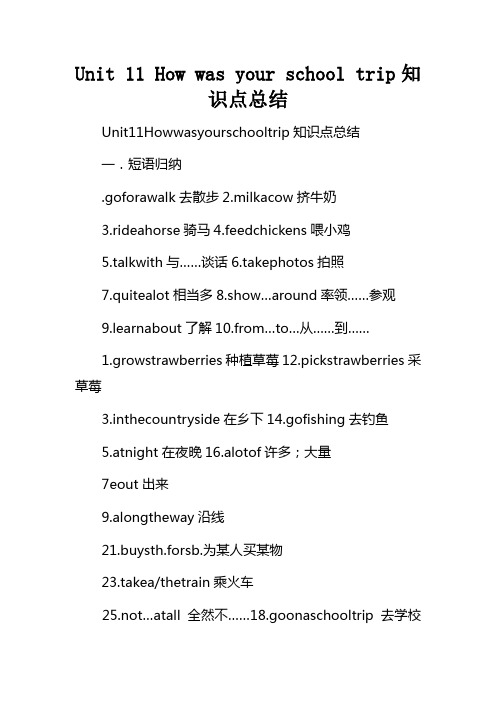
Unit 11 How was your school trip知识点总结Unit11Howwasyourschooltrip知识点总结一.短语归纳.goforawalk去散步kacow挤牛奶3.rideahorse骑马4.feedchickens喂小鸡5.talkwith与……谈话6.takephotos拍照7.quitealot相当多8.show…around率领……参观9.learnabout了解10.from…to…从……到……1.growstrawberries种植草莓12.pickstrawberries采草莓3.inthecountryside在乡下14.gofishing去钓鱼5.atnight在夜晚16.alotof许多;大量7eout出来9.alongtheway沿线21.buysth.forsb.为某人买某物23.takea/thetrain乘火车25.not…atall全然不……18.goonaschooltrip去学校郊游20.afterthat以后22.allinall总的来讲24.beinterestedin对……感爱好二.用法集萃.How+be…?+like?……怎么样?2.toomany+可数名词复数太多的……3.toomuch+不可数名词太多的……4.teachsb.howtodosth.教某人如何做某事5.quite+a/an+形容词+可数名词单数=a+very+形容词+可数名词单数一个相当/很……三.重点句型.—Didyouseeanycows?—yes,Idid.Isawquitealot.你看到奶牛了么?是的,我看到很多。
2.—Didyourideahorse?—No,Ididn’t..ButImilkedacow.你骑马了吗?没有,可是我喂了奶牛。
3.Thefarmershowedcarolaroundthefarm.农人带着卡诺参观了农场。
4.carolpickedsomestrawberriesandtookthemhome.卡诺采了一些草莓并带回了家。
七年级英语下册Unit 11 How was your school trip超全重要短语和句子(英汉対译)
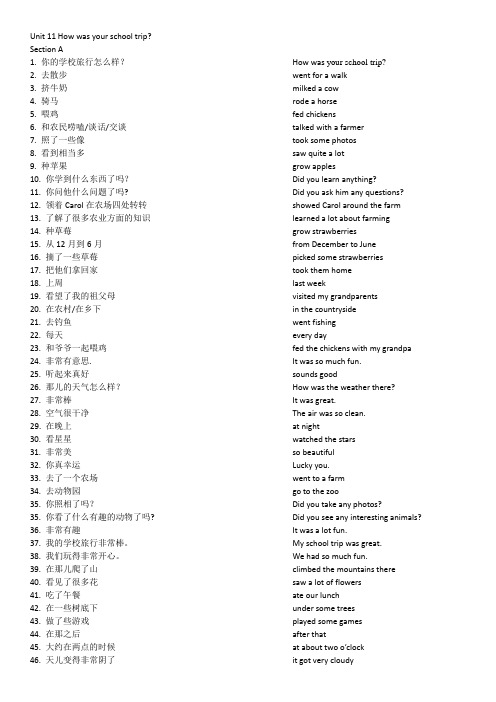
Unit 11 How was your school trip?Section A1. 你的学校旅行怎么样?How was your school trip?2. 去散步went for a walk3. 挤牛奶milked a cow4. 骑马rode a horse5. 喂鸡fed chickens6. 和农民唠嗑/谈话/交谈talked with a farmer7. 照了一些像took some photos8. 看到相当多saw quite a lot9. 种苹果grow apples10. 你学到什么东西了吗?Did you learn anything?11. 你问他什么问题了吗? Did you ask him any questions?12. 领着Carol在农场四处转转showed Carol around the farm13. 了解了很多农业方面的知识learned a lot about farming14. 种草莓grow strawberries15. 从12月到6月from December to June16. 摘了一些草莓picked some strawberries17. 把他们拿回家took them home18. 上周last week19. 看望了我的祖父母visited my grandparents20. 在农村/在乡下in the countryside21. 去钓鱼went fishing22. 每天every day23. 和爷爷一起喂鸡fed the chickens with my grandpa24. 非常有意思. It was so much fun.25. 听起来真好sounds good26. 那儿的天气怎么样?How was the weather there?27. 非常棒It was great.28. 空气很干净The air was so clean.29. 在晚上at night30. 看星星watched the stars31. 非常美so beautiful32. 你真幸运Lucky you.33. 去了一个农场went to a farm34. 去动物园go to the zoo35. 你照相了吗?Did you take any photos?35. 你看了什么有趣的动物了吗? Did you see any interesting animals?36. 非常有趣It was a lot fun.37. 我的学校旅行非常棒。
人教版七年级英语下册Unit11Howwasyourschooltrip单元复习
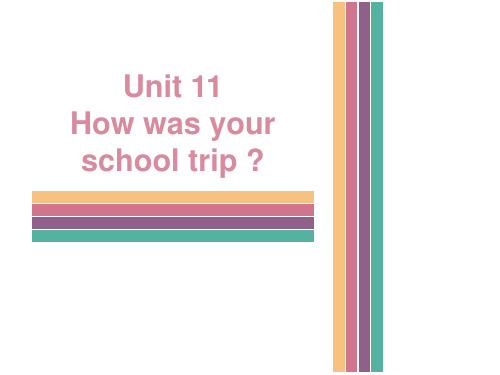
2.__ta_k_e_____ 4.__h_a_d_____ 6._r_o_d_e_____ 8.__b_u_t_____ 10.__a_______
基础复现天天练 Work seriously
●难点释疑 ①go on a school trip意为“参加学校郊 游”。如: All the students went on a school trip last week. 上周所有学生都参加学校郊游活动。 ②worry是动词,意为“担心”。常见一般 搭配为 worry about。如: You don’t need to worry about me.
目录 contents
4 主要语法
主要语法
Work seriously
四、主要语法 用一般过去时询问或描述过去事 件及关感受
★询问对过去事件的感受: 1.—How was your school trip? —It was great. ——你的学校旅行怎么样?——很好。 2.—Were the strawberries good ? —Yes, they were. ——草莓好吃吗?——是的,好吃。
Life on the farm was so much 8 .We went fishing in the early morning, went 9 a walk after
基础复现天天练 Work seriously
supper and watched the 10 at night when the weather was fine.They were very beautiful.
Have 10 nice day! Write to me if you can.
Yours, Lily
新目标英语七年级下册讲义—Unit 11 How was your school trip

新目标七年级下册Unit 11 How was your school trip? 讲义一、重点单词k 挤奶2. cow .奶牛3. horse 马4. feed 喂养;饲养5. farmer 农民;农场主6. quite 相当;安全7. anything (常用于否定句或疑问句)任何东西;任何事物8. everything 一切;所有事物9. grow 种植;生长;发育10. farm 农场;务农;种田11. pick 采;摘12. excellent极好的;优秀的13. countryside 乡村;农村14. yesterday 昨天15. flower花16. worry 担心;担忧17. luckily 幸运地;好运地18. sun 太阳19. museum博物馆20. fire 火灾21. painting .油画;绘画22. exciting adj.使人兴奋的;令人激动的23. lovely可爱的24. expensive 昂贵的25. cheap 廉价的;便宜的26. slow缓慢的;迟缓的27. fast 快地(的)28. robot .机器人29. guide 导游;向导30. gift 礼物;赠品31. dark 黑暗的;昏暗的32. hear(heard)听到;听见自测表:二、短语归纳1.school trip 学校旅行2.go for a walk 去散步k a cow 给奶牛挤奶4.ride a horse 骑马5.feed chickens 喂鸡6.talk with 和......交谈7.take photos /a photo拍照st week上周9.ask some questions问一些问题10.quite a lot 相当多11.show sb. around sp.带某人参观某地12.learn about 了解13.grow strawberries种植草莓14.from...to... 从…到…15.pick some strawberries摘草莓16.take sth home带…回家17.climb the mountains 爬山18.visit my grandparents看望我的祖父母19.go fishing 去钓鱼20.so much 如此多的21.go to the zoo去动物园22.go to a farm去农场23a lot of fun很多乐趣24.play games 做游戏e out 出来26.go to the countryside去乡下27.science museum科学博物馆28.visit a museum 参观博物馆29.play chess with sb... 和…下棋30.buy sth for sb为某人买31.be interested in…对…感兴趣32.all in all总的来说33.not...at all 一点也不,根本不三、句型集萃1. How + be…? + like? ……怎么样?2. How do/does+主语+feel about...? 对......感觉如何?3. too many + 可数名词复数太多的……4.teach sb. how to do sth. 教某人怎样做某事5.quite + a / an + 形容词+可数名词单数= a + very + 形容词+可数名词单数一个相当/ 很……6.buy sth. for sb.=buy sb. Sth.为某人买东西7.It’s +形容词+to do sth. 做某事是......的8.sound+形容词听起来......四、词汇、句型讲解及拓展1.How was your school trip?学校旅行怎么样?【解析】How+be+主语?=What be+主语+like?意为“….怎么样?”★★★本句的答语:It was great./It was OK./It was/wasn’t good….【拓展】how是疑问副词,意为“怎么样,怎么”,用来构成特殊疑问句,主要用法如下:1)询问如何做某事,或者做某事方式。
Howwasyourschooltrip教案(共5则范文)
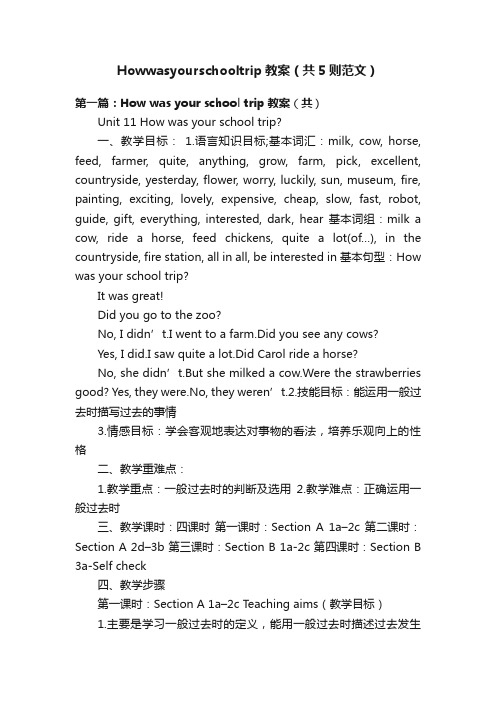
Howwasyourschooltrip教案(共5则范文)第一篇:How was your school trip 教案(共)Unit 11 How was your school trip?一、教学目标:1.语言知识目标;基本词汇:milk, cow, horse, feed, farmer, quite, anything, grow, farm, pick, excellent, countryside, yesterday, flower, worry, luckily, sun, museum, fire, painting, exciting, lovely, expensive, cheap, slow, fast, robot, guide, gift, everything, interested, dark, hear 基本词组:milk a cow, ride a horse, feed chickens, quite a lot(o f…), in the countryside, fire station, all in all, be interested in 基本句型:How was your school trip?It was great!Did you go to the zoo?No, I didn’t.I went to a farm.Did you see any cows?Yes, I did.I saw quite a lot.Did Carol ride a horse?No, she didn’t.But she milked a cow.Were the strawberries good? Yes, they were.No, they weren’t.2.技能目标:能运用一般过去时描写过去的事情3.情感目标:学会客观地表达对事物的看法,培养乐观向上的性格二、教学重难点:1.教学重点:一般过去时的判断及选用2.教学难点:正确运用一般过去时三、教学课时:四课时第一课时:Section A 1a–2c 第二课时:Section A 2d–3b 第三课时:Section B 1a-2c 第四课时:Section B 3a-Self check四、教学步骤第一课时:Section A 1a–2c Teaching aims(教学目标)1.主要是学习一般过去时的定义,能用一般过去时描述过去发生的事情,学会使用一般过去时的陈述句,及一般疑问句和答语。
How_was_your_school_trip

Unit 11 How was your school trip?Section A【目标呈现】知识目标:词汇:gift, hang, win, prize, visitor, end, monitor, off, rain短语:hang out, sleep late, day off, have a great time, at the end of句型:1. How was your school trip?2.—Did you go to th—e zoo?—No, I didn’t. I went to the aquarium.3. —Were there any sharks?—No, there weren’t any sharks, but there were some really smart seals.语法:一般过去时的用法(一)。
能力目标:学习询问和谈论过去发生的事情。
情感目标:引导学生关注自己身边的人、事物及自然界中与我们共同生活的其他生命。
教师寄语:A good book is the best of friends, the same today and forever.一本好书,相伴一生。
【基础巩固】自主学习一、重点词汇拓展1. 逗留;徘徊____________ (过去式) ____________2. 赢;获胜____________ (过去式) ____________3. 访问者;参观者____________ (动词) ____________4. 结束;结尾____________ (动词) ____________5. 驾驶;驱车旅行____________ (过去式) ____________6. 雨;雨水____________ (过去式) ____________二、重点词组识记1. 闲荡;闲逛____________________2. 睡过头;起的晚____________________3. (因病或节假日)休息;不工作;不上学____________________4. 去水族馆_____________________5. 玩得高兴____________________6. at the end of ____________________7. take photos _____________________8. win a prize _______________________9. sound interesting ____________________10. watch a dolphin show _____________________三、重点句型体验:根据所给的图画情景和提示词,写出与图片相符的英语句子,标点符号已给出。
人教七下Unit 11 How was your school trip?知识点

Unit 11 How was your school trip?Section A1. How was your trip yesterday?(1)本句为询问某事情况的常用句型,其中was是be动词的过去式,如果询问当前的情况则be动词用is。
其答语常用:It was great! (好极了) / It was OK.(还可以)/ It wasn’t good.(不好。
)/ All right.(很好。
)/ It was not bad.(还不错。
)等。
How + be+…?相当于What + be +… + like? 例如:-How was her holiday?-It was not bad.(2)How是疑问副词,意为“如何,怎样”,常用来引导特殊疑问句来询问方式、程度、状况等。
常用于以下交际用语中:1)How is/are +sb. ? 用来询问人的身体、工作、学习或生活等的状况。
例如:-How are you? -Fine, thank you.2)How is/are +sth.?用来询问某物或者某事的状况如何。
例如:How is your work?3)How do you do? 并不表示疑问,是第一次见面时的问候语,回答仍用此句。
例如:How do you do? ---How do you do?4)How is it going?/ How is everything going? 用来询问事情进展如何。
例如:How is it going? Very well./ Not too bad./just so so.2. feed chickenfeed 作及物动词,意为“喂养,饲养”,其后常接表示动物名称的词作宾语。
例如:My father’s job is to feed the animals.拓展:(1)feed..to…意为“把……喂给……吃”。
feed后接饲料或者食物名称做宾语,to为介词,其后一般接动物或者小孩等名词表示对象。
人教版七年级下英语Unit 11 How was your school trip单元知识复习总结

Unit 11How was your school trip?重点词汇重点短语Section A 1.milk a cow给奶牛挤奶2.ride a horse骑马3.feed chickens喂鸡4.quite a lot (of...)许多……5.in the countryside在乡下;在农村6.go for a walk去散步7.talk with a farmer 与一位农民交谈8.take some photos拍一些照片9.grow apples种苹果10.show sb.around带某人参观11.learn a lot about...学习许多关于……12.pick some strawberries采摘一些草莓13.last week上周14.go fishing去钓鱼15.so much fun如此多的乐趣16.at night在夜晚17.school trip学校旅行18.climb the mountains爬山19.come out 出现Section B 20.fire station消防站21.all in all总的说来22.be interested in对……感兴趣23.go to the zoo去动物园24.visit a museum参观博物馆25.climb a mountain爬山26.buy sth.for sb.为某人买某物27.not...at all一点儿也不28.along the way沿途,一路上29.teach sb.how to do sth.教导某人如何做某事30.slow train慢火车31.gift shop礼品商店32.an exciting day令人兴奋的一天33.at the museum在博物馆34.draw pictures画画35.see some painting看见一些画重点句型1.How was your school trip?/What was your school trip like?你(们)的学校郊游怎么样?2.The farmer showed Carol around the farm.这位农民带着卡萝尔参观了农场。
2020年人教版七年级英语下册Unit11 How was your school trip 要点详解
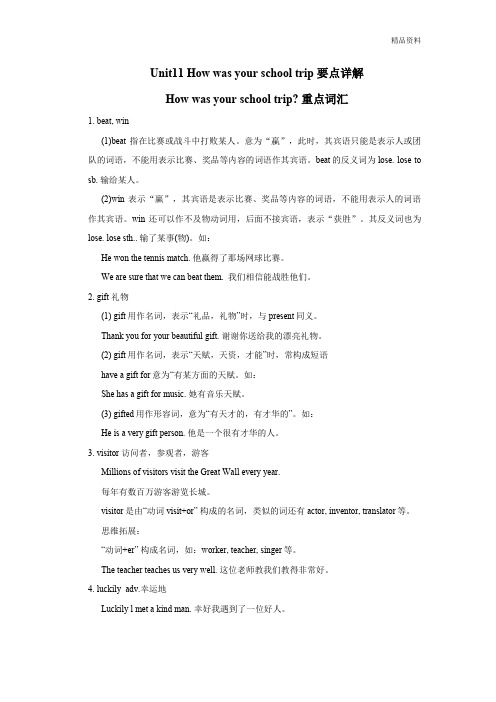
Unit11 How was your school trip 要点详解How was your school trip? 重点词汇1. beat, win(1)beat指在比赛或战斗中打败某人。
意为“蠃”,此时,其宾语只能是表示人或团队的词语,不能用表示比赛、奖品等内容的词语作其宾语。
beat的反义词为lose. lose to sb. 输给某人。
(2)win表示“赢”,其宾语是表示比赛、奖品等内容的词语,不能用表示人的词语作其宾语。
win还可以作不及物动词用,后面不接宾语,表示“获胜”。
其反义词也为lose. lose sth.. 输了某事(物)。
如:He won the tennis match. 他赢得了那场网球比赛。
We are sure that we can beat them. 我们相信能战胜他们。
2. gift 礼物(1) gift用作名词,表示“礼品,礼物”时,与present同义。
Thank you for your beautiful gift. 谢谢你送给我的漂亮礼物。
(2) gift用作名词,表示“天赋,天资,才能”时,常构成短语have a gift for意为“有某方面的天赋。
如:She has a gift for music. 她有音乐天赋。
(3) gifted用作形容词,意为“有天才的,有才华的”。
如:He is a very gift person. 他是一个很有才华的人。
3. visitor 访问者,参观者,游客Millions of visitors visit the Great Wall every year.每年有数百万游客游览长城。
visitor是由“动词visit+or”构成的名词,类似的词还有actor, inventor, translator等。
思维拓展:“动词+er”构成名词,如:worker, teacher, singer等。
The teacher teaches us very well. 这位老师教我们教得非常好。
人教版初中英语七下unit11笔记

Unit 11 How was your school trip?一、单元语法点: 一般过去时1.定义:表示过去某个时间或者某一段时间内发生的动作或存在的状态,也表示过去经常或反复发生的动作.2.句型结构:1)含be 动词am/is→ was are→ were肯定句:主语+was/were + 其他.否定句:主语+was/were + not 其他.一般疑问句:Was/Were +主语+其他?肯定回答:Yes, 主语+was/were ;否定回答:No, 主语+was/were not特殊疑问句:疑问词+一般疑问句(除去句中提问部分)?Eg:Tom was a student ten years ago.Tom wasn’t a student ten years ago.Was Tom a student ten years ago ? Yes, he was; No, he wasn’t.Who was Tom ten years ago ?2)含实义动词(否定句和疑问句借助did)(无人称和单复数的变化)肯定句:主语+动词过去式+ 其他.否定句:主语+didn’t +动词原形+其他.一般疑问句:Did +主语+动词原形+其他?肯定回答:Yes, 主语+did ;否定回答:No, 主语+didn’t.特殊疑问句:疑问词+一般疑问句(除去句中提问部分)?Eg:Tom went to the zoo yesterday.Tom didn’t go to the zoo yesterday .Did Tom go to the zoo yesterday ? Yes, he did; No, he didn’t.What did Tom do yesterday ? When did Tom go to the zoo?3.标志词:(一般以现在作为时间参考点)1)yesterday;2)时间段+ago; ten years /months/weeks .....ago3)last+年/月/周/星期last year/month/week/Sunday.....4)in+年/those days在那些天in 20094.规则动词的过去式变化规则:1).一般情况下在动词原形后+ed.eg:milk →________;talk →________;show→________;pick →________2)以不发音e结尾的+d.eg: live → __________ ;hope → _________ ;use → ________ ;arrive→ ________3).以重读闭音节结尾的动词,双写末尾仅有的辅音字母,再+ed.eg: stop → __________ ;plan → __________ ;drop → _________4).以辅音字母+y结尾的,变y为i+ed.eg:study → __________;carry → __________;worry →;__________5.常用不规则动词的过去式变化(必背)①go → ________ ①ride → ________ ①feed → ________ ①take → ________①do → ________ ①say → ________ ①see → ________ ①grow → ________①eat → ________ ①have/has → ________ ①buy → ________ ①get → ________①come → ________ ①draw → ________ ①know→ ________ ① teach→ ________①make→________ ①swim→________ ①bring → __________ ①cut → ________21.drink → ________ 22.drive → ________ 23.feel → ________ 24.fight → ________25.find →__________ 26.fly → ________ 27.forget →__________ 28.hear → ________ 29.keep → ________ 30.wear → ________ 31.write→ ________ 32. leave → ________ 33.let → ________ 34. lose → ________ 35.meet → ________ 36.pay → ________ 37.put → ________ 38.read → ________ 39.run → ________ 40.sell → ________41.sing → ________ 42.sit → ________ 43.sleep → _______ 44.speak → ________45.spend → ________ 46. stand → ________ 47 tell → ________ 48.think → ________ 49.can→ ________ 50.study→ ________二、常用句型:1.How be .....?=What be .....like ?.....怎么样?How is the weather today?=what’s the weather like today?今天天气如何?How was your school trip?=What was your school trip like?你的学校旅行怎么样?2.How do you feel (about sth) ?=How do you like sth?=What do you think of sth ?你认为....怎样?3.I don’t know how to do it.(it 是do 的宾语)= I don’t know what to do next.(what 和do是动宾关系)我不知道接下来该做什么?三、◆短语归纳1). go for a walk=take/have a walk 去散步2). milk a cow=milk cows 挤牛奶3). ride a horse=ride horses 骑马4). feed chickens 喂小鸡5). talk with 与……谈话6). take photos=take a photo 拍照take some photos拍很多照片7). quite a lot =very相当多8). show… around 带领……参观9). learn about 了解10). from… to… 从……到……11). grow strawberries 种植草莓;grow up 长大/成长;grow into 长成;12). pick strawberries 采草莓; pick up(动副短语)捡起/拿起/接人13). in the countryside 在乡下14). go fishing 去钓鱼;go climbing去爬山;go swimming去游泳;go shopping去购物;go hiking去远足;go skating去滑雪15). at night 在夜晚;at noon 在中午16). a lot of=lots of 许多;大量17). come out 出来/ 开花18). go on a school trip 去学校郊游19). along the way沿线;by the way 顺便说/顺便问一下;on the way to +地点在去....途中On one’s way home 在某人回家途中;20). after that 之后21). all in all 总的来说22).be interested in 对……感兴趣23). not… at all 根本不……not at all 不客气/不用谢24).Sounds great 听起来棒极了.四、理解后记忆:1.复合不定代词:something;everything;anything;nothing;a.后加形容词adj或不定式to do.(修饰词后置)eg: something important一些重要的事情/东西;something to eat一些吃的东西b.作主语时,看成三单,谓语动词用单数.eg: Nothing is impossible.一切皆有可能.c.Something用于肯定句;anything用于疑问句;nothing=not anythingeg:Is there anything to eat ?有任何吃的东西吗?I eat nothing=i don’t eat anything .我什么也没吃.I buy nothing=I didn’t buy anything.我什么也没买.2.study for .....为....而学习eg:Tom is studying for my English test.3.feed sth to sb把....喂给...吃=feed sb with/on sth用....喂....4.sound + adj Sounds great听起来棒极了;sound like+短语/句子eg:It sounds like you like English.5.quite a lot 整体看成是副词adv,修饰动词;eg:I saw quite a lot.我看到很多. quite a lot of +可数名词复数/不可数名词eg:There are quite a lot of books in the library.图书馆有相当多的书.6.ask sb sth=ask sb about sth 询问某人某事ask ab (not)to do sth要求某人(不要)做某事ask sb for sth.向某人要某物ask for help 寻求帮助7.learn to do sth学习做某事;learn ....from....向/从....学习;learn a lot of about...学习/了解很多关于....8.watch sb do sth.观看某人过去做了/经常做某事(强调过程/结果)watch sb doing sth.观看某人正在做某事(强调正在进行)eg:I often watch Tom play basketball after school.我经常看到汤姆在放学之后打篮球.Look, many people watch the monkeys climbing around.看,很多人在看猴子到处爬来爬去.相同类似的用法有:一感feel sb do/doing sth;二听hear/listen to sb do/doing sth ;三让let/make/have do sth ;四看see/watch/look at/notice sb do/doing sth ;另发现find sb do/doing sth → listen 是不及物动词,后面不能直接跟宾语9.teach sb sth教某人某事teach us English教我们英语;teach sb to do sth教某人去做某事10.1)not ...at all(not通常隐藏在谓语动词里)Eg:I don’t like ice-cream at all.我一点也不喜欢冰淇淋.Tom isn’t kind at all.汤姆一点也不善良.2)not at all不客气/不用谢-Thanks -not at all.不用谢11. arrive at+小地点到达小地点;arrive in +大地点到达大地点arrive there/here/home 到达那/这/家12.复习:1)buy sb sth=buy sth for sb买某物给某人; sell sb sth= sell sth to sb.卖某物给某人;2)get on/off bus/train 上/下公共汽车/火车2)too much +不可数名词;too many+可数名词复数;much too+adj/adv3)表建议:let/what about/why don’t you do/why not do五、名词n1.同类一起记:n & vmilk名词:牛奶(不可数名词);动词:挤奶;worry名词:令人发愁的事(可数)/忧虑(不可数);动词:担心(三单worries);fire名词:火(火灾可数;火不可数); 动词:领导/带领;flower名词:;花; 动词:浇花;guide名词:导游; 动词:领导/带领;farm名词:农场; 动词:务农/种田;2.fire station消防站;回顾:radio station/bus station/police station3.打包记忆:farm-farming-farmer六、形容词adj/副词adv1)exciting 常修饰物an exciting day令人兴奋的一天;excited 常修饰人be excited at/about ....某人对....感到兴奋;同理:interesting 常修饰物an interesting news一个有趣的消息;interested 常修饰人be interested in sth/doing sth 对某事/做某事感兴趣2)luck名词幸运-lucky形容词幸运的-unlucky形容词不幸的luckily副词幸运地-unluckily副词不幸地3)ly结尾是adj: lovely可爱的;friendly友好的4)正反义词:expensive昂贵的-cheap便宜的; slow慢的-fast快的5)用an 的形容词:an art museum一个美术博物馆;an exciting news 一个令人兴奋的消息;an excellent actist一个杰出的画家;an interesting book 一本有趣的书;七、作文:描述过去发生的事情描述过去经历:框架:时间+地点+和谁+天气+交通方式+所见所闻所尝所做+感受Last weekend, I went to 某地with my parents,the weather was great and we took the train to there, we visited many places in 某地.First of all, we visited ....., then ..........the food were delicious,and the people were friendly.We had great fun in 某地./We were tired but happy.范文:An Exciting TripLast weekend,I went to the museum with my parents.We left at 8:30 in the morning.We went there by bus .It took us about 30 minutes to get to the museum. In the museum,we saw many old and interesting things. We also listened to the guide along the way,he told us many history stories,they are very interesting.And we watched the video about the museum,too. We came back at 5:00 in the afternoon.We were tired but happy and excited.。
人教版pep英语七年级下册-Unit-11-单元分析

比分析能力。
品店的东西很贵。
分课时教学目标
课时 period 1
period 2
Period 3 Period 4
Period 5
分课时教学目标
学生能够: 1.了解卡罗尔在旅行中做了什么的详细信息,并复述卡罗尔的 旅行经历; 2.正确使用目标语言进行关于旅行的对话。
1.获得埃里克、简和托尼旅行的详细信息; 2.用目标语言复述和谈论这些旅行; 3.从更多方面分享我们自己的旅行,并思考我们可以从旅行中 得到什么。
作业设计 根据农场旅行vlog编写对话(学习理解+应 用实践) 描述自己的一段令人难忘的旅行经历(应 用实践+迁移创新)
利用静态雕像进行故事接龙(应用实践+迁 移创新)
按要求编写和Jim的对话(应用实践+迁移 创新)
写一篇旅行日记(应用实践)
教学内容 语篇类型
Period 4
2b两篇日记 (应用文)
What
Why
How
Helen和Jim的日记,记录了 2b两篇日记是两个人 因为是日记体裁,所以这两
对待同一场学校旅行两人不 对同一场学校旅行截 个语篇均使用第一人称和一
同的感受和评价。
然不同的记录与感受。 般过去时按照旅行发展的顺
Helen认为参观科学博物馆 启发学生对于看待事 序去展开描述,Helen与Jim
行很糟糕,觉得火车很慢车 写作。
lovely, exciting,
厢里面很热,博物馆大且无
terrible, hot, boring等
趣,因为他对机器人不感兴
形成的对比,这不仅考查了
趣。馆内很暗所以他没拍照。
学生对篇章的理解,培养了
而且人很多,他看不清也听
人教版英语七年级下册Unit11Howwasyourschooltrip.教学设计
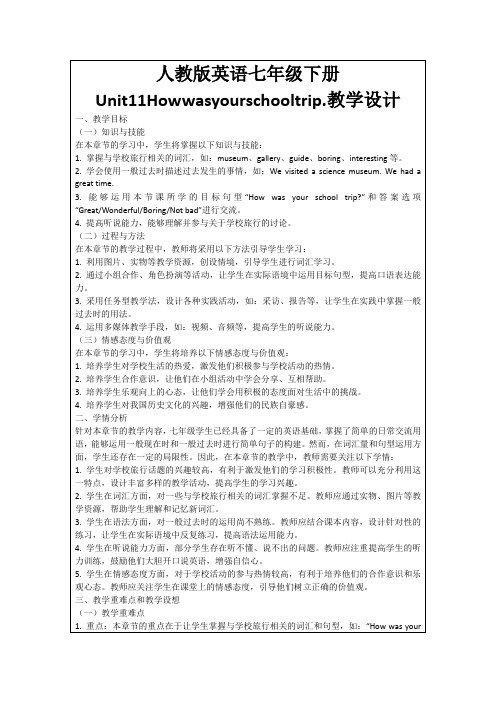
2.学生在词汇方面,对一些与学校旅行相关的词汇掌握不足。教师应通过实物、图片等教学资源,帮助学生理解和记忆新词汇。
3.学生在语法方面,对一般过去时的运用尚不熟练。教师应结合课本内容,设计针对性的练习,让学生在实际语境中反复练习,提高语法运用能力。
1.重点:本章节的重点在于让学生掌握与学校旅行相关的词汇和句型,如:“How was yourschool trip?”和答案选项“Great/Wonderful/Boring/Not bad”,并能运用一般过去时进行交流。
2.难点:
(1)一般过去时的运用,尤其是在描述过去发生的具体事件时,学生容易混淆时态。
2.口语作业:学生与家长或朋友进行一次关于学校旅行的英语对话,并录制下来。对话中需包含至少五个本节课学到的词汇和两个句型。
3.阅读作业:阅读一篇关于学校旅行的英文文章,并完成相应的阅读理解练习。文章将提供给学生,要求学生在阅读过程中注意理解一般过去时的运用。
4.词汇巩固:完成一份词汇练习,包括填空、选择、匹配等形式,旨在巩固本节课所学的与学校旅行相关的词汇。
4.学生在听说能力方面,部分学生存在听不懂、说不出的问题。教师应注重提高学生的听力训练,鼓励他们大ห้องสมุดไป่ตู้开口说英语,增强自信心。
5.学生在情感态度方面,对于学校活动的参与热情较高,有利于培养他们的合作意识和乐观心态。教师应关注学生在课堂上的情感态度,引导他们树立正确的价值观。
三、教学重难点和教学设想
(一)教学重难点
2.通过小组合作、角色扮演等活动,让学生在实际语境中运用目标句型,提高口语表达能力。
【学习实践】Unit 11 How was your school trip-知识点整理

Unit 11 How was your school trip?知识点整理Unit11Howwasyourschooltrip?知识点整理一、重点短语1.goforawalk去散步2.rideahorse骑马3.playwith和某人玩4.takeaphoto照相、拍照5.quitealot相当多6.showsb.around带领某人参观7.somuchfun很多快乐8.havefun享受快乐9.gofishing去钓鱼10.climbthemountains爬山11.playgames做游戏12.beworried担心13.firestation消防站14.goonatrip去旅游15.bytrain乘火车16.takeatrain乘火车17.alongtheway沿途18.playchess下象棋19.buy...for...为某人买某物20.allinall总之21.beinterestedin对......感兴趣22.not...atall一点二.重点句型1.Howwasyourschooltrip?=whatwasyourschooltriplike?你们的校游怎么样?2.Thefarmershowedcarolaroundthefarm.那农民带着卡罗尔参观了农场。
3.carollearnedalotaboutfarming.卡罗尔学了很多关于农活的。
4.wehadsomuchfun.我们享受了这么多乐趣。
5.Itwasdifferenttotakephotos.拍照很难。
6.Icouldn’treallyseeorheartheguide.我真的看不见也听不到导游的。
7.Ididn’tlikethetripatall.我一点也不喜欢这次出游。
也不。
Unit_11_How_was_your_school_trip_Section_B_3a--self_check

home, but tomorrow he is ______ (take) a taking
bus there.
按照要求完成句子, 每空一词。
1. Peter did his homework last night. (改为否 定句) didn’t do Peter ______ ______ his homework last night. 2. There were some children in the park just now.(变一般疑问句,并进行否定回答) Were any —_____ there ______ children in the park just now? there _______. —No, ______ weren’t
Unit 11 How was your school trip?
Section B
Period 2 (3a-Self Check)
翻译下列短语和句子。 1. 到达那儿 get there 2. 下棋 play chess play the piano play basketball
弹钢琴
打篮球
3. 对感兴趣 be interested in all in all 4. 总之
1 Write more verbs and their past forms in each group. climbclimbed
pick-picked milk-milked play-played stay-stayed want-wanted
arrivearrived
hope-hoped live-lived movemoved dancedanced
人教版七年级英语下册 Unit11How was your school trip_重点知识点
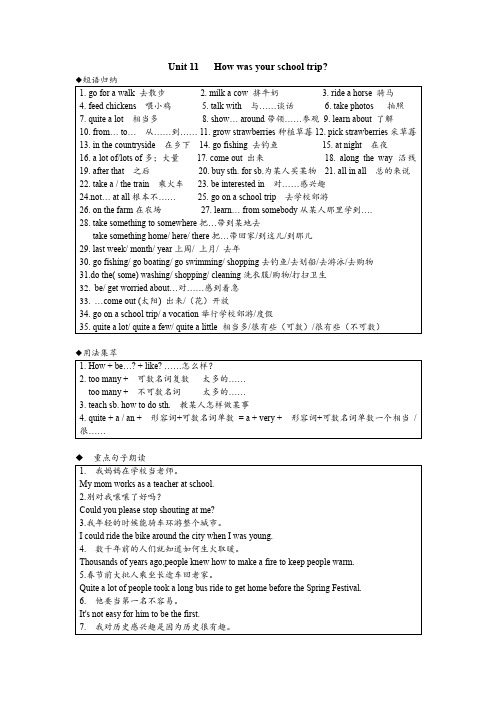
18.乘火车我们很快就到了那儿。
We got there so fast by train.
19.沿途我们看见了些农场和村庄。
We saw some farms and villages along the way.
20.我不知道它们还有本事和我们下棋。
◆用法集萃
1. How + be…? + like? ……怎么样?
2. too many +可数名词复数太多的……
too many +不可数名词太多的……
3. teach sb. how to do sth.教某人怎样做某事
4. quite + a / an +形容词+可数名词单数= a + very +形容词+可数名词单数一个相当/很……
4.数千年前的人们就知道如何生火取暖。
Thousands of years ago,people knew how to make a fire to keep people warm.
5.春节前大批人乘坐长途车回老家。
Quite a lot of people took a long bus ride to get home before the Spring Festival.
22. take a / the train乘火车23. be interested in对……感兴趣
24.not… at all根本不……25. go on a school trip去学校郊游
26.on the farm在农场27. learn… from somebody从某人那里学到….
28. take something to somewhere把…带到某地去
Unit 11 How was your school trip(讲义及答案)
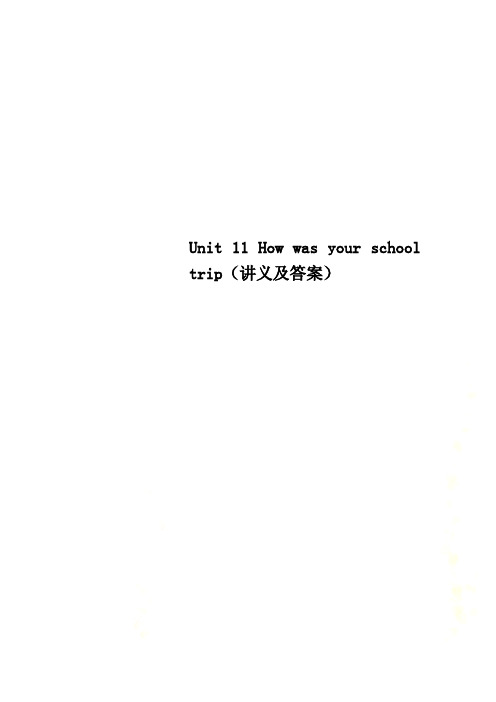
Unit 11 How was your school trip(讲义及答案)Unit 11 How was your school trip?(讲义)Part 1 Words and Expressionsmilk /mɪlk/ v. 挤奶cow /kaʊ/ n. 奶牛milk a cow 挤奶horse /hɔː(r)s/ n. 马ride a horse 骑马feed /fiːd/ v.(fed /fed/)喂养;饲养feed chickens 喂鸡farmer /'fɑː(r)mə(r)/n. 农民;农场主quite /kwaɪt/ adv. 相当;完全quite a lot (of…) 许多anything /'enɪθɪŋ/pron.(常用语否定句或疑问句)任何东西;任何事物grow /grəʊ/ v. (grew/ɡruː/)种植;生长;发育farm /fɑː(r)m/ n. 农场v. 务农;种田pick /pɪk/ v. 采;摘excellent /'eksələnt/adj. 极好的;优秀的countryside /'kʌntrisaɪd / n. 乡村;农村in the countryside 在乡下;在农村yesterday /'jestə(r)di/adv. 昨天flower /'flaʊə(r)/n. 花worry /'wʌrɪ/ v. & n. 担心;担忧luckily /'lʌkɪli/ adv. 幸运地;好运地sun /sʌn/ n. 太阳museum /mjuː'ziəm/n. 博物馆fire /'faɪə(r)/n. 火;火灾fire station 消防站painting /'peɪntɪŋ/n. 油画;绘画exciting /ɪk'saɪtɪŋ/adj. 使人兴奋的;令人激动的lovely /'lʌvli/ adj. 可爱的expensive /ɪk'spensɪv/ adj. 昂贵的cheap /tʃiːp/ adj. 便宜的;廉价的slow /sləʊ/ adj. 缓慢的;迟缓的fast /fɑːst/ adj. & adv. 快地(的)slow & fastadj. 缓慢的;迟缓的adj.& adv. 快地(的)adj.a slow driver a fast walkerI missed the fast train and had to get the slow one.adv.slowly & fastCan you speak slowly? The boy runsfast.interesting adj. 感兴趣的be interested in 对……感兴趣I am interested in music and my brother is interested in sports. We had a great time on the farm yesterday. We were interested in milking the cow.be interested in 主语通常是人,接动词时用动词的-ing 形式。
- 1、下载文档前请自行甄别文档内容的完整性,平台不提供额外的编辑、内容补充、找答案等附加服务。
- 2、"仅部分预览"的文档,不可在线预览部分如存在完整性等问题,可反馈申请退款(可完整预览的文档不适用该条件!)。
- 3、如文档侵犯您的权益,请联系客服反馈,我们会尽快为您处理(人工客服工作时间:9:00-18:30)。
How was your school trip?
Period 1
Section A 1a~1c
Brainstorming
Weekend activities: What do you usually do o/does he / she / they often do?
What did you do last weekend?
What did they do last weekend?
watched TV played soccer
listened to music go(went) shopping
read a book (read)
eat(ate) ice cream go(went) to the zoo
Were there any….in the park
elephant panda
monkey
aquarium tiger
seal shark
Make a survey: Did you have a trip?
What did you do last weekend?
What did they do last weekend?
watched TV played soccer
listened to music go(went) shopping
read a book (read)
eat(ate) ice cream go(went) to the zoo
go to the beach
have some ice cream
— Did they go shopping? — No, they didn’t. — Did they visit the museum. — Yes, they did.
What did you do on your last school trip? Did you go to the zoo? Did you go to the aquarium? Were there any…? What else did you do? …
Did you +V. …….? Yes, I did. I V.-ed ……. (No, I didn’t.. I didn’t +V.….
buy (bought) a gift take( took) photos have ( had) a pizza
go (went) to outdoor pool watch (watched) a movie about sharks
go to the beach
have some ice cream
go fishing
Did you …? Yes, I did. / No, I didn’t.
surf the Internet
go skateboarding
play soccer
Make a survey: Did you have a trip?
go fishing
Did you …? Yes, I did. / No, I didn’t.
surf the Internet
go skateboarding
play soccer
— Where did you go last Sunday?
— I went to Beijing City.
— Where did she go last Sunday?
Talk about past events
Do you know what animals there
are on the farm?
cow
horse
chicken
duck
goose
dog
pig
sheep
Read the words and expressions loudly.
milk
cow
did some washing yesterday. She ________________
Did he… last night?
read a book last night. He ___________
— Did he go … ? — Yes, … . / No, … .
Look !
activities
take took photos played play beach volleyball
win a prize won 奖品
bought buy a dress
ride a horse rode
What did you they do last Sunday?
Ask like this: Did he watch TV last night?
— She went to the beach.
— Where did he go last Sunday?
— He stayed at home.
— Where did they go last Sunday?
— They went to summer camp.
Language Goal :
Ask your parents when and where did they ever went, and what they think of their vacations. Then make a recording. ( 问问你的父母曾经何时去过什
么地方, 感觉如何,并作好记录。)
Section A 2a-3b
What did you do last weekend?
watch ed TV
listen ed to music go (went) skateboarding
played soccer
What did you do last weekend?
go to the beach went cleaned the room
Look at the pictures and ask like this:
— Did you / he / she / they go …? — Yes, I / he / she / they did. ( No, I / he / she / they didn’t.)
Did she…yesterday?
surfed the Internet
What did you do on your last school trip?
went to the beach (go)
went to the zoo
saw some seals (see)
took photos (take)
What did you do on your last school trip?
On rainy Day
watched TV with a friend
went for a drive
had / ate ice cream (have/ eat)
went out with friends (go)
bought a gift (buy)
visit Visitors’ Center (visited)
1b
Listen and circle the three things Carol did on her school trip. 1. went for a walk 2. milked a cow 3. rode a horse 4. fed chickens 5. talked with a farmer 6. took some photos
Present am Past was
is
are
was
were
根据句意及首字母填空 1. Our job is to m ilk the cows. _ 2. We t ook many photos about Mount. Hua last year. 3. Now I will f_______ the pet cat. eed ode 4. He r_______ a horse to visit last month. armer 5. In Australia, a f_______ can have lots of field(田地). 用括号内所给单词的适当形式填空 came 1. Tom and Mary ________ (come) to China last month. didn’t 2. My mother ________ (not do) housework yesterday. Did go 3. ________ your father ________ (go) to work every day last year? was 4. He ________ (be) here just now. have 5. Did she ________ (have) supper at home?
watch (watched) a dolphin show
Which activities did I do?
met meet friendly have delicious food had got get sb’s letter people
climb the mountain climbed go shopping went eat ice cream ate saw see interesting movies
He often does his homework.
She often plays football.
They often go shopping.
They often watch TV.
Where are you on weekends? I am at home. Where were you last weekend? I was at home.
